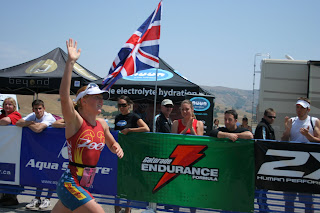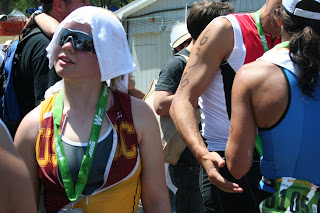With that in mind, spinning podcasts will take a break (because I haven't already been taking a break, right?) until late fall, when it gets cold enough that everyone will head back into the gym/house to ride on their stationary trainers.
You know what kind of audio we need, though?
Pre-game.
Why listen to music before a race? I have a few reasons, but I'll preface them by saying it's a pretty individual thing. I have two main reasons: The first is that it's easier to push myself farther than I want to go when in my head Eminem is screaming at me to "lose myself in the music." The other is that it's helpful for me to get an appropriate rhythm stuck in my head before I go out to race.
What's an appropriate song, though? Again, it's very individual. One of my athletes really enjoys the Tim McGraw song "How Bad Do You Want It?" I might listen to that song when I'm training or use it for a cycling workout, but not when I'm racing. It's too obvious for me (Melissa Etheridge's "Run for Life" is the same way; great for training, but too obvious for racing), intensity is too low, and I don't particularly enjoy country music. But if you really hate rock, rap, or ska, you might really hate my selection of pre-race songs.
So having said all that, I present to you my suggestions for pre-race music. These songs have a driving beat at an appropriate tempo for swimming, cycling, and running (some more appropriate than others); lyrics that encourage reaching beyond the present moment, or that force you to remember an object greater than the current challenge; and I like them. This is the music playing on my iPod the night before a race (or sometimes an important workout), driving to a race site, and setting up transition.
The Song: Quest
The Artist: Bryn Christopher
Why it's Here: These lyrics: "What I'm gonna live for / What I'm gonna die for / Who ya gonna fight for"
The Song: Way Away
The Artist: Yellowcard
Why it's Here: Driving beat and catchy lyrics will help you wake up at 4:34 in the a.m. Cause it's hard to be sleepy when you're singing along at the top of your lungs.
The Song: Saturday Morning
The Artist: Eels
Why it's Here: Even though most triathletes race on Sundays more often than Saturdays, the central idea of the song--"It's Saturday morning! Stop sleeping 'cause it's time to play!"--is totally appropriate. Let this song remind you that you're playing out there; you don't have to take yourself so seriously.
The Song: 'Cause You Can
The Artist: Birdmonster
Why it's Here: "Cause you can!"
The Song: Remember the Name
The Artist: Mike Shinoda (Linkin Park's DJ) Feat. Styles Of Beyond - Fort Minor
Why it's Here: This song is all about earning respect by working hard. This song is about entitlement; you've worked hard to compete at your event, so go out and give everyone a reason to remember who you are.
The Song: Breathing
The Artist: Yellowcard
Why it's Here: Same reason the other Yellowcard song is on here; it's catchy, it's high-energy, and it's fun to sing along to.
The Song: The Dirty Glass
The Artist: Dropkick Murphys
Why it's Here: This song is fun. And that is enough.
The Song: Overrated
The Artist: Less Than Jake
Why it's Here: The lyrics in this song speak to how boring everything is, how it's hard to find something worth doing. Before a race, I like to remind myself that the intensity of a triathlon is a step above the humdrum of normal life.
The Song: U + Ur Hand
The Artist: P!nk
Why it's Here: Just for this line: "You don't really wanna mess with me tonight."
The Song: Pressing On
The Artist: Relient K
Why it's Here: "I'm pressing on, pressing on / All my regrets are going, going gone / Pressing on, pressing on." Yeah, just try quitting with this song running through your head.
The Song: Lose Yourself
The Artist: Eminem
Why it's Here: "You better lose yourself in the music, the moment, you want it / You better never let it go / You only get one shot, do not miss your chance to blow / This opportunity comes once in a lifetime." The hardest hills seem easy with this one; this one carries me through.
What are your suggestions for pre-game songs? Why do you listen to music before a big event, or, if you don't listen to music, why not? Sound off in the comments!
The Song: Remember the Name
The Artist: Mike Shinoda (Linkin Park's DJ) Feat. Styles Of Beyond - Fort Minor
Why it's Here: This song is all about earning respect by working hard. This song is about entitlement; you've worked hard to compete at your event, so go out and give everyone a reason to remember who you are.
The Song: Breathing
The Artist: Yellowcard
Why it's Here: Same reason the other Yellowcard song is on here; it's catchy, it's high-energy, and it's fun to sing along to.
The Song: The Dirty Glass
The Artist: Dropkick Murphys
Why it's Here: This song is fun. And that is enough.
The Song: Overrated
The Artist: Less Than Jake
Why it's Here: The lyrics in this song speak to how boring everything is, how it's hard to find something worth doing. Before a race, I like to remind myself that the intensity of a triathlon is a step above the humdrum of normal life.
The Song: U + Ur Hand
The Artist: P!nk
Why it's Here: Just for this line: "You don't really wanna mess with me tonight."
The Song: Pressing On
The Artist: Relient K
Why it's Here: "I'm pressing on, pressing on / All my regrets are going, going gone / Pressing on, pressing on." Yeah, just try quitting with this song running through your head.
The Song: Lose Yourself
The Artist: Eminem
Why it's Here: "You better lose yourself in the music, the moment, you want it / You better never let it go / You only get one shot, do not miss your chance to blow / This opportunity comes once in a lifetime." The hardest hills seem easy with this one; this one carries me through.
What are your suggestions for pre-game songs? Why do you listen to music before a big event, or, if you don't listen to music, why not? Sound off in the comments!
P.S. I also have a few other songs that I put on there, for no other reason than that I like them and they get me going, get me ready to race! You'll see those extra songs once iTunes decides to publish my iMix in their stupid store.










